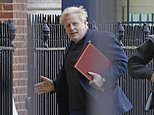Bullish Boris Johnson unleashes his inner Margaret Thatcher as he pledges to cut taxes
Bullish Boris Johnson unleashes his inner Margaret Thatcher as he pledges to cut taxes, slash spending and remove tariffs on some food imports in bid to shore up his position after confidence vote
Boris Johnson yesterday pledged to slash government spending and cut taxesThe Prime Minister hinted the UK may remove import tariffs on foodstuffs that are not produced in the country, such as coffee, tea, rice, olive oil and bananasRishi Sunak is resisting Tory pressure to cut personal taxes in his autumn Budget
<!–
<!–
<!–<!–
<!–
(function (src, d, tag){
var s = d.createElement(tag), prev = d.getElementsByTagName(tag)[0];
s.src = src;
prev.parentNode.insertBefore(s, prev);
}(“https://www.dailymail.co.uk/static/gunther/1.17.0/async_bundle–.js”, document, “script”));
<!–
DM.loadCSS(“https://www.dailymail.co.uk/static/gunther/gunther-2159/video_bundle–.css”);
<!–
Boris Johnson yesterday pledged to slash government spending and cut taxes
Boris Johnson revealed a Thatcherite streak yesterday as he pledged to slash government spending and cut taxes.
And he indicated he will start by reducing tariffs on imported food.
In his first major speech since this week’s bruising revolt against his leadership, the Prime Minister signalled a drive to cut the size of the state in the wake of the pandemic.
Echoing both Margaret Thatcher and Ronald Reagan, he said there were many areas where the Government should ‘simply get out of the way’ and let people get on with their lives.
He said he was determined to lower the record tax burden, which he described as an ‘aberration’ caused largely by the ‘fiscal meteorite of Covid’.
But sustained tax cuts would require a reduction in the size of the state following a period of ‘phenomenal corporate welfare’, he said.
In comments that will cheer the Tory Right, Mr Johnson said: ‘It is time for the Government to stop spending, and to start cutting taxes and cutting regulation.
Rishi Sunak is resisting Tory pressure to cut personal taxes in his autumn Budget, arguing that it would risk fuelling runaway inflation
‘Sometimes the best way that government can help is simply to get out of the way. To do less or better, or simply not at all.’
Mr Johnson dropped a heavy hint that the new tax-cutting agenda will start with the removal of import tariffs on a range of foodstuffs that are not produced in this country, such as coffee, tea, rice, olive oil and bananas.
Speaking in Blackpool, he said the Government was ‘on the side of British farmers’ and would maintain ‘sensible’ tariffs to protect domestic agriculture.
But he added: ‘We are also on the side of British consumers. We do not grow many olives in this country that I’m aware of.
‘Why do we have a tariff of 93p per kilo on Turkish olive oil? Why do we have a tariff on bananas?’
Whitehall sources confirmed the plans to cut food tariffs – a move opposed by Trade Secretary Anne-Marie Trevelyan, who argues it could weaken the UK’s hand in trade negotiations. Mr Johnson is said to have sided with other Cabinet ministers, including Jacob Rees-Mogg, who argue it is a good way of using the UK’s post-Brexit freedoms to cut the cost of living.
The PM did not rule out a further reduction to fuel duty. But he said the first priority was to ensure the 5p-a-litre cut agreed in March is being passed on in full and not ‘swallowed up’ by petrol retailers.
Rishi Sunak is resisting Tory pressure to cut personal taxes in his autumn Budget, arguing that it would risk fuelling runaway inflation. The PM appeared to acknowledge the risk but added: ‘The overall burden of taxation is now very high. Sooner or later – and I would much rather it was sooner than later – that burden must come down.’
In comments that were condemned by trade unions, the PM said wage restraint would be needed to prevent inflation sparking a recession.
He hinted at other measures to cut the cost of living, such as increasing the number of children a childminder can look after.
And he called for reform of the rail industry to prevent even higher fares, such as closing ticket offices that now see little use, saying: ‘There are fully manned ticket offices in this country that barely sell a ticket a week.’
Echoing both Margaret Thatcher and Ronald Reagan, Johnson said there were many areas where the Government should ‘simply get out of the way’ and let people get on with their lives
![]()


